#i have so many thoughts and feelings about s5 so far that I must commit to paper hruyggnm
Explore tagged Tumblr posts
Text




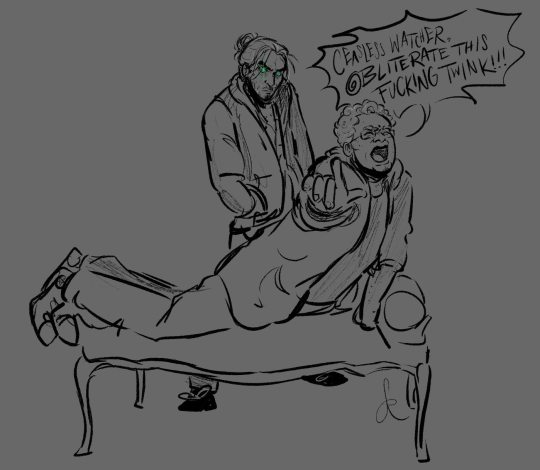
As promised, incredibly stupid s4-5 drawings
#i didn't sign the one I actually colored but it's fucking fine I guess I'll redraw it later anyways#I am never satisfied when I color my shit in fr#martin blackwood you are the realest of the fucking real for asking your man to eldritch-equivelent block someone cuz youre jealous#hate him all you want he's out here speaking the truth#he wants that twink obliterated because he's jealous and he is not ashamed to admit it!#i have so many thoughts and feelings about s5 so far that I must commit to paper hruyggnm#one of which being that Jon is wearing martins flannel in the fucking eminem pose I drew him in#it's the little things I say as I go ever so slightly more insane#my art#the magnus archives#tma season four#tma season 5#tma#tma spoilers#tma fanart#tma podcast#the magnus pod#martin blackwood#jonathan sims the archivist#jonathan sims#jon sims#god i hope those tags arent for the real ass dude#jonny why did you name the poor meow meow after youself man why#jonmartin#good god what is their ship name#jmart#tma jmart#jmart fanart#“ceaseless watcher. show me this guy's balls”#please do not do that I'm quoting a meme
839 notes
·
View notes
Text
i really wish the writers of lucifer hadn't turned chloe and maze's friendship into such an afterthought! like ok:
- when they start in season 2, both of them are in pretty isolated places socially. chloe, already a pretty introverted workaholic, is just newly divorced and has exactly one (1) friend: lucifer. maze has finally split off from lucifer and has two (2) friends: linda and trixie, but for the purposes of this comparison linda really is maze's one friend. maze has just accepted that she's not actually going back to hell, that this time on earth isn't really just a lunch break before they go back to the real world (hell) and so she now has to figure out how to build a real life in LA.
- basically, both maze and chloe are kind of in similar positions in terms of being isolated and really only having a singular overwhelming relationship with someone as opposed to having a network they can rely on so that all their eggs aren't in one basket. you can see where this backfires on both of them throughout the series when linda spends the week not talking to maze after seeing lucifer's face, and when lucifer runs off to vegas and suddenly chloe is stuck with all these feelings she can't express (and crucially can't talk about to him, her best friend.) ofc lucifer and maze's relationship transcends friendship just based on their immense history and is its own weird thing that i also kind of wish they had given more thought to, but w/e.
- enter: maze and chloe's friendship! i think for both maze and chloe, the other person is as "far" as you could get from themselves, but is fascinatingly still someone they can like, respect, love, and be loyal to. for a good while (and this is something i REALLY wish they had maintained) chloe, maze, and dan are basically raising trixie together which takes so much respect and trust that the other person is someone you want having a hand in influencing a kid you love! i think what's interesting is that, unlike lucifer who is trying to answer existential questions about his place/purpose in the universe, maze is really just focused on the people she cares about and having a good time (which is rooted in her doing meaningful work as a bounty hunter.) chloe is someone who pursues duty to the point of self-sacrifice, and obviously her friendship with lucifer helps her loosen up, but the pedestal he places her on/reverence he sometimes feels for her prevents him from really popping that bubble in the same way maze does. also chloe and lucifer's relationship gets SO much more complicated around the time maze enter's chloe's life so the role that lucifer once had to shock chloe out of her comfort zone kind of goes to maze once chloe has to draw some personal boundaries with lucifer.
- i think the key to maze and chloe's friendship is that they're both people who desperately need someone who embodies the other person's best trait. while this tendency isn't always healthy, maze is fundamentally someone very loyal to those she believes deserves it. obviously she's also betrayed people a billion times but at her core she's deeply committed to those she cares about which is something that i can see chloe find really appealing. at this point chloe has spent so much of her life in this weirdly precarious position where, since her dad's death she hasn't been able to fully trust anyone or open up to them. obviously she loves dan, but its clear that even when they're still "good" he doesn't trust her instincts or potential like he should, and when he spent those months gaslighting her the issue for her even beyond the fact that he shot malcom would have been that he didnt support or trust his wife. the appeal of lucifer is that from the beginning he identifies that she's smart and moral with good instincts. he trusts her, and strangely over the season she begins to trust him too! and then he runs off to vegas, etc etc lol. maze's primary loyalty probably isn't to chloe, but we see that to the best of her capacity she wants chloe to be happy -- she gets the prison warden killed, she "tries" and then really does listen to chloe venting about lucifer, attends the parent night chloe was stressed about, sets aside her grudge with lucifer to find chloe.
- in turn, chloe's best trait is her ability to accept people as they are and see their potential. of course she doesnt really have that many friends, but the people she is attracted to are all works in progress (dan is obvious, as are lucifer and maze lmao, but there's also ella who confesses something very personal and scary to chloe and gets a hug in return, and even charlotte who chloe's had clashes with both as charlotte and Mom for years but still gets the benefit of the doubt.) maze does have to change when she comes to live with chloe and trixie, but we see trixie grow up heavily influenced by maze in ways that makes it clear that chloe must genuinely like maze, or those influences like the handshake and the passion for gore and the knife training wouldnt have been allowed. we know that the reason maze is so loyal to lucifer is that he was the first person to ever accept her for who she was unconditionally, without shame or judgment. we see that for lucifer chloe is that person, especially because she sees his potential for growth just as she sees maze's. because she doesnt have preconcieved notions of what they're supposed to be she only sees them as people going through a difficult period of growth and supports them as best she can: reminding maze that they're friends, worrying about her in canada, trusting her with trixie who is the most important person in chloe's life.
- of course, chloe and maze have lucifer and linda but narratively lucifer and linda become so much MORE for chloe and maze. the show sunk linda/maze lmao but linda's clearly the adult maze cares most about just as lucifer is chloe's. and for both in s3 this person they each place so much of themselves into suddenly hurts them and they both spiral. i think there was real potential for chloe and maze to become each other's support and develop into a really steady, enduring friendship in contrast to the chaos of their individual romances (you will NEVER convince me that triangle was about amenadiel rather than linda lmao.) even post s3, they don't really address that maze really hurt chloe by pushing her towards pierce, and that chloe hurt maze by lying to her. i really think there could have been a lot of growth from maze going back to living with chloe and trixie after making full ammends and chloe realizing that actually, yes she can deal with this and it isn't that scary and then the tragedy of her maybe missing her shot with lucifer becomes more stark. we see chloe and maze teaming up in the first episode of 5A but then they blow that up too! i get that chloe needs space and its clear they're both using the other as placeholders for the people they really want, but there's no reason that they couldnt have come back together later and re-established their friendship on screen. obv they wouldnt work together after lucifer comes back, but to me this is where i believe they should go back to living together. without that, maze's connection to trixie in terms of what they can show on screen becomes tenuous and chloe's home life just becomes less interesting/worthwhile to see bc it'd just be her or maybe her with trixie. without that, it feels like we just see a lot of chloe either at work or in relation to lucifer (bc thats the best bang for your buck in terms of interaction!) we do get to see maze with linda, which is nice, but idk just feels like a step back from early s3 when maze felt more embedded in a community of people who liked, accepted, and cared about her wellbeing.
- i think one of the issues is that chloe and maze's friendship might have seemed like a knock off of their "main" relationships with lucifer and linda bc they have similar dynamics with them, but idk! there's a sense of fun that we get from their friendship that we dont really see from the main pairings because those are so serious and passionate and the main mechanisms by which the 4 grow so there isn't as much room for the lighter stuff. i know i said that chloe sees the potential for growth but she's not really pushing maze to talk about her feelings. she's doing the dishes maze won't, smiling at maze and trixie's handshake, shrugging off the fact that maze is throwing knives at their rented walls. maze and chloe create space for each other to be seen as themselves, good or bad, in ways that linda and lucifer can't for whatever reason. they don't really push each other, just let the other person be. it wouldnt be the ideal dynamic if they were the only person in each other's lives, but i think its vital to have someone in your life who can, in chloe's case, gently push you outside of your comfort zone and in maze's case offer acceptance, friendship, and trust.
idk this is just going in circles as i repeat the same points over and over and over but i really wish they had put more thought into sustaining the maze and chloe friendship throughout s4 and s5 because it would have brought out notes in both of them narratively that i think are lost otherwise. also its just sad for trixie that someone who was basically part of her family who she was living with is just...not there anymore and that's never addressed. : (
#lucifer#maze#chloe decker#lol im just writing this here to avoid doing school work rip#back to pretending to do a reading!!!
31 notes
·
View notes
Text
Lovely, Dark, and Deep: A TMA Fanfic (Whumptober 2020)
Also on AO3. S5 spoilers - this is Episode 170 from Jon’s POV.
No.8: Isolation
“I think we’re almost out,” Jon said, glancing around him. It was hard to tell for sure by the appearance of the realms—that was the point of them, after all, to seem infinite—but the sense that had guided them thus far told Jon they didn’t have much farther to go. “It’s amazing. I haven’t felt that need to make a statement about this one. I wonder if it’s because there’s no avatar here? Or at least because I took one out prior to...all of this?”
He glanced over his shoulder to solicit Martin’s thoughts on the matter and felt his blood run ice cold.
Martin wasn’t there.
“Martin?” he called sharply, stopping and turning around. There were dozens—hundreds—of people around him, all of them fading through various shades of grey, all of them seeming to ignore one another, and all of them looking lost and bewildered and upset. But nowhere in the room could Jon see the tall, broad-shouldered teddy bear of a man who should have been following him.
He paused for a moment, closed his eyes, and took a few deep, slow breaths. He knew what Martin looked like, of course he did. He held the image in his mind for a second: the mop of curly hair now streaked with white, the round glasses, the jumper he favored particularly because Jon had once offhandedly complimented it (and then spent the next several hours hiding in his office panicking that he’d said too much). The vibrant colors that made up the man. He even flipped through several possible facial expressions he could be making—exasperation at Jon’s pace or forced politeness at wading through people who didn’t notice him or (hopefully) mild panic. Dismissing that as an unimportant detail, he opened his eyes and looked around.
Nothing.
“Martin!” Jon called again. No response. There was nothing for it; he’d have to retrace his steps. Hopefully Martin had had the sense to stay put wherever he was when they got separated—how had they gotten separated? Martin had been right behind him the whole time, when he wasn’t right beside him. A crowd must have pushed between them. Jon must have just been going too fast to notice. That had to be it. It had to have been a crowd. He’d find Martin in one of the rooms, sitting on one of the probably-uncomfortable chairs, waiting for Jon to come back.
He wouldn’t have kept moving, Jon told himself as he started back the way he’d come, looking frantically around him. He’d have stayed. If he didn’t know where Jon had gone, he’d have stayed in the last room he was in, waiting for him, and Jon could just...retrace the route. Simple.
The problem with this place was that every room was exactly like every other room. Indistinguishable, unremarkable, impersonal. Short of marking the walls, there was no way to be absolutely certain what rooms he’d passed through and what rooms he hadn’t. And the route he Knew, he realized as he started backwards, was the route forward. They’d committed to this course, to heading to London and the Panopticon and the Eye and Elias, and he Knew where they were going. He didn’t Know where they’d been, except in the vaguest and most general of senses. They’d been through six nightmare realms so far, this being the seventh. But he couldn’t say for certain where exactly they’d been. This place was deliberately meant to be obfuscating, to keep you in a perpetual state of...not confusion, that was the Spiral’s bailiwick, but...
Isolation, his brain supplied helpfully, and Jon cursed at it. He did not need the reminder of which domain they were in. Which domain he’d thought, mercifully, he would escape without the need to make a statement about it. He did not want to think about this domain, this entity, at all. There was nothing, no one, here for him to take revenge on—he’d already done that—but, God, did he want to tear this house to pieces, brick by brick. He wanted to grab each person he passed by the shoulders and say I see you, I know you, there are others here, you are not alone—but he couldn’t. He couldn’t interfere in another entity’s domain, couldn’t free any of these people from their nightmares.
Couldn’t...oh, God. Isolation. Nightmares. Martin.
“Martin!” Jon bellowed, a little louder. He strained to hear. There was no sound but the faint susurration of the whispers of the people trapped here. There were so many of them, but each one thought they were alone. The ones that were talking—the ones that were still strong enough to talk to themselves, to make themselves feel a little less...no. Even them he couldn’t hear clearly, even when he strained to do it.
They were so convinced no one was listening that the one person who was listening couldn’t hear them. Martin. No. No, Martin had to know he was there, had to know he was coming. He couldn’t have forgotten. He couldn’t have...given up.
Unbidden, the thought of the last time he’d been in...this entity’s domain came to his mind. The fog, God, the ever-present fog. Calling desperately. The smarmy, taunting voice telling him He doesn’t want to see you. He’d known that was a lie then, known it with a desperate certainty. Peter Lukas had worked on Martin, eroded away at him for months, whittled him down until he was—until he thought he was nothing, less than nothing. Until he’d been willing to stay, thought he deserved it.
Jon had never told Martin, but he’d come close to succumbing, too. It wasn’t like he’d never been l—solitary before. He’d spent most of his strange, unhappy childhood with nothing but books for company, and it had almost been too late when he’d learned to make friends. He’d tried too hard to be professional his first year as Archivist and only hadn’t managed to isolate himself completely because all of his assistants, in their own way, had insisted on remaining or becoming a part of his life. And then after the worms, after the discovery of Gertrude Robinson’s body, when Jon had let his paranoia get the better of him and sealed himself away from everyone...only Martin hadn’t let him, even then, had fought to keep him present. And it would have been worse after Leitner’s murder and he’d gone on the run if Georgie hadn’t taken him in, at least at first. He’d certainly felt it then. He knew what it felt like. He’d almost given in to the fog.
But he’d held on, held onto the fact that Martin was in the fog somewhere. He wasn’t alone—neither of them were alone, because Martin had been there and so had Jon and even if they couldn’t see one another yet, they were both there. So he’d called Martin’s name, and then he’d found Peter Lukas and fought him and won, which he never would have been able to do if Martin hadn’t already fought him and won. And then he’d found Martin again, and Martin had seen him, and they’d come out of the fog together.
They’d done it once. They could do it again. Jon just had to find him before...no.
“Martin!” he called again, somewhere between a shout and a sob. This wasn’t happening, this couldn’t be happening. He couldn’t have been so feeble, so stupid as to lose sight of Martin in a place like this. A place that had almost taken him once.
Desperate, almost frantic, he wandered through room after room, searching, calling. Martin had to be here somewhere. God, how many rooms did this damned house have?
It didn’t matter, he realized. The realm was as infinite as it needed to be, and also as limited. Every room was different, but every room was the same. It could hold thousands of people, but each one would assume that they were the only one.
That they had always been the only one.
Jon fought down the panic and tried to think. Martin had to be in here somewhere. It was a feature of the domain. There was no way out beyond death, and it was too...early? Was that the word? The entities weren’t ready to relinquish their victims just yet. Death wouldn’t be able to start feeding off the other realms until it had completely depleted its own store. There was no way to leave, ergo, Martin had not left. The only one who knew the way out was Jon, and Jon was not with Martin; therefore, Martin had not found the way out. He must be somewhere in this house.
Yes, all right, that was perfectly logical and all that nonsense. But “somewhere” covered a lot of ground. And Jon didn’t know where he’d let Martin slip away.
Know. Discomfort fluttered through Jon’s stomach. He’d been trying very hard to find Martin the traditional way, not to use his abilities. He’d promised to stay out of Martin’s head, and he had. Martin was the most important thing in the universe to him, even before he’d become the only real thing he had left, and he wouldn’t do anything to ruin that. Including, and especially, betray his trust.
But...this was different. Martin was lost somewhere...no, not lost, just...missing. This realm was near-infinite. Jon could wander forever and not find him, and although time wasn’t really a factor anymore per se, he was desperately afraid that if he took too long finding Martin, Martin would succumb. Maybe...think he’d been abandoned on purpose. That Jon saw him as a burden, a drag on his mission, or worse—that Jon had been humoring him up to this point, that he’d never intended to do what he could to fix the mess he’d been used to cause, and that he’d abandoned him at the first possible opportunity so he could...enjoy the apocalypse.
No. No, Martin had to know Jon wasn’t like that. Jon loved Martin, had loved him for longer than he’d been willing to admit, would love him until the end of the universe. And Martin loved him, had loved him even when he’d been doing his best to push him away, would love him as long as he had the capacity. He’d said as much, so many times, and Jon believed him without even needing his powers. He saw it in his eyes, heard it in his voice, felt it in his touch. Martin had to know that Jon felt the same way. It wasn’t like he was subtle about it, for God’s sake.
Martin hadn’t left Jon, even after he’d accidentally ended the world. He had to know that went both ways. He had to.
Jon took a deep breath. He was starting to spiral. It wasn’t the first panic attack he’d ever had in his life, but it was definitely on its way to being one of the worst. That wouldn’t help him. Or Martin. He had to hold on to that. Martin needs you. Keep it together. You have to find Martin. You can’t fall apart in a nightmare.
Right. So. He’d promised not to pry into Martin’s head. But it was the only way Jon could guarantee he’d find him. Surely Martin would forgive him, if—when—he knew. Because Jon would tell him, as soon as he found him. They were trying to be honest with one another, about what they did, how they felt. They were trying to communicate. Jon wasn’t particularly good at it, but he was trying. So he would Look, he would Know where Martin was, and he would find him and apologize and they would get the hell out of there.
He took another deep breath and concentrated on the question: Where is Martin?
A beat passed, another. Jon strained as hard as he could. He could...he could feel Martin’s mind out there, somewhere, in a room. Feel something about him. He was...talking. To someone? Most likely to himself. Jon couldn’t pick up the words. Everything was...muffled. Muted.
Faded.
No.
He had to have hope. The ones who were still talking were the ones who hadn’t given up yet. They talked because the sound of their voice made them feel less alone. If Martin was talking...that meant he was still holding on. It was when he stopped...Jon could feel the pauses in his words, and every time he stopped talking, he could feel him slipping a little farther away.
“Martin!” Jon shouted, his voice cracking with desperation and fear. “Martin, please answer me, please.”
Just like that, he heard his name, or maybe felt it. For a moment, there was a bright flare, almost of light, like a beacon, and Jon rushed towards it desperately. He went through a door, though, and the light was gone, leaving him even more lost than before.
No. Not lost. He wasn’t lost, and neither was Martin. They were...separated. It was just temporary. They would find one another. There was no way they would be trapped forever in this hellscape.
Well. Jon wouldn’t be trapped forever. He was too much the Eye’s creature to be trapped anywhere. These nightmares, as he’d told Martin repeatedly, weren’t for him—for them. This one was just trying to take Martin because he’d been Marked by the Lonely.
There.
He’d thought it.
This was the Lonely.
And it was trying to take Martin away from him.
No.
Martin was his anchor—had been a lot longer than he’d admitted it, even to himself. He’d wondered, once or twice, distantly, what would have happened if he’d realized that before going into the Buried after Daisy, if he’d realized a body part wouldn’t be his best choice for an anchor and used something else, like one of the recordings Martin had made of his poems while he’d been trapped in the Archives. If Martin’s voice wouldn’t have brought him safely out of the coffin sooner, and forced Elias—Jonah—to scramble for another way to have the Flesh mark him. If they’d have been able to suss out Jonah’s plan and foil it before it could fully realize. He couldn’t Know the future, even hypotheticals, but he’d still gone over it time and again. He’d never mentioned it to Martin, figuring his boyfriend had enough to worry about. But whenever he got a quiet moment to himself, he thought about it. And now Martin wasn’t there to keep him steady.
For a moment, Jon was tempted to give in to despair, the despair he’d been fighting since he’d woken on the floor of the cabin in Martin’s arms and heard the roar from outside and known, even more than Known, what it meant. He couldn’t get through this on his own. Even if he believed they were doing any good, even if he thought there was a chance that Gertrude was wrong and he could fix the apocalypse, he knew he couldn’t do it without Martin there to ground him, to give him a reason to go on. He did think those things, but...but it was Martin that made him believe that, Martin’s quiet strength and gentle guidance and above all the feel of his fingers laced through Jon’s when they strode through the more difficult terrain.
God, why hadn’t Jon held his hand? He’d known this would be a tricky one, but stupidly, he’d thought they would be okay. He’d thought that, because the floors were even and the path was regular and the people were...only barely there and not enough to really affect them physically, that they didn’t need to help each other walk. He was such an idiot. He always had been, really. He’d thought the end of the world would be enough of a monument to stupidity, assumed that there really couldn’t be more evidence that he made decisions that were both moronic and outright bad than the fact that he’d earnestly believed he was saving the people he loved, and the entire world, but was in fact taking gigantic leaps and bounds towards destroying them all.
He’d been wrong, because now his idiocy had cost him the one thing the apocalypse had spared him. It had cost him Martin.
No. No! Jon couldn’t let himself believe that. He couldn’t believe that this was it. Martin was still out there, he was still talking, and Jon would find him and once he did he would never let him go again. Martin was damn well going to have to listen to the next statement Jon had to make, because Jon was scared, damn it, and he was going to hold on to Martin as long as he could. Maybe even longer.
He felt something again, all at once. Something in his heart getting warmer, a strengthening of his willpower and determination, a grounding. He felt as if his foundations had been reinforced, all of a sudden. He could almost hear a voice thrumming through his chest, a steady, rhythmic chant, panic slowly easing out of the voice as it grew stronger and stronger—
Wait. He could hear a voice.
“Martin!” he shouted, putting every last bit of love and desperation and need in his body into his voice to give it as much volume as he could.
He heard his name, faintly, in reply, and his head snapped around. He practically ran, his steps taking him faster and farther than he’d thought possible. “Martin! Martin?”
“Jon! Jon, over here!”
Martin’s voice was the most wonderful thing Jon had ever heard. Jon gasped out in relief as he focused his knowledge on Martin’s whereabouts. “Martin, hold on, I—I’m coming, I just—”
And then he burst through the next doorway and there Martin was, on his feet, face pale and eyes wet, clutching something tightly in one hand and head turned towards Jon. Relief flooded through Jon’s entire body and he almost collapsed before he made it to Martin’s side. “Oh, Martin, thank God, I—I was—”
He broke off, unable to finish the sentence, and simply wrapped his arms around Martin tightly. Martin was cold, so very cold, as cold as he’d been the last time the Lonely had almost taken him away, but he was solid and real and his heart thudded strongly in his chest, and his arms as they went around Jon were just as firm as always. He was alive. He was safe. He was here.
“I—I thought you were behind me,” Jon managed.
Martin let out a soft breath—and then uttered the words that almost broke Jon completely. “I thought you’d left me behind. Gone on without me.”
“No, never. N-never, I—I just—” Jon pulled back from the hug and looked up at Martin, and the words tumbled out of him in a panicked rush. “I—I didn’t want to—Look too h—I, I-I promised I wouldn’t Know you, and with the fog, and—and all the rooms, I—I just—I lost you...” He managed to draw a breath, hoping it would steady him a little. “I’m sorry.”
“It’s okay,” Martin replied immediately, and God, how had Jon managed to get so lucky?
It took him a couple breaths—both of them needed a couple breaths—before Jon managed to speak again. “No, I—I tried to use the—” He sighed, remembering he’d promised himself to be honest, and continued, “—to Know where you were, but it was—you—you were faint. It was so strange...it took me so long to find you.”
Martin squared his shoulders and straightened, rubbing at the back of his neck with his free hand. “Jon, it’s—okay, I promise it’s okay. This place tried, it really did, and honestly, I—” He sucked in a breath. “I wanted to believe it.” Before Jon could panic, he added, “But I didn’t.”
“This place, i-it—” Jon began. Before he could finish his sentence, his eyes lit on the object in Martin’s hand. A tape recorder.
The familiar static filled Jon’s head, and he suddenly Knew what was on that recorder. The statement filled his mind, telling him every word Martin had spoken into the device, every thought his boyfriend had had while struggling desperately to remember who he was, who Jon was. His self-deprecating jokes and his pathetic wistfulness, his smallness, his fear. Everything Peter Lukas had tried to make of him...except now Jon could hear that stretching back years, long before Martin had ever come to the Institute. Lukas had only built on what was already there.
“My God,” he whispered. The recorder was still whirring away, but Jon had heard the entire playback in a matter of seconds.
“Yeah,” Martin agreed.
Jon swallowed hard. What he was about to say went against every instinct he had...but he loved Martin, he had to give him a choice. Had to make sure he knew this wasn’t a forced death march or anything.
“M-Martin—if you—did,” he began. “I-if you wanted to forget a-all of it, stay here...” He closed his eyes for a brief second, fighting to get the words out. “I—I would understand.”
Time had no meaning in this place, in this post-apocalyptic world, so it was entirely possible that there was an actual eternity in the heartbeat of silence after Jon’s words, who was to say?
“N-no,” Martin said finally, and Jon felt relief crash down on him like a physical force. “It’s comforting here, leaving all those—painful memories, behind, but—it’s not a good comfort, it’s—i-it’s the kind that makes you fade, makes you dim and...distant.”
“Okay,” Jon whispered. He licked his lips, then said in a more normal tone of voice, “Okay, good. I—” He took a deep breath to steady himself. “I wanted to make sure you knew what this place was.”
“It’s the Lonely, Jon.” Martin’s voice, his eyes, were sad, almost resigned. “It’s me.”
The words pierced Jon through the heart. He pulled Martin back into a hug, even tighter than before. “Not anymore,” he said forcefully.
Martin gave a soft laugh that warmed Jon to his toes. He returned the embrace. “No,” he agreed. He let out all the air in his lungs in a long, deep rush. “No, not anymore.”
The sudden click made both of them jump. Jon realized it was the tape recorder, still dangling from Martin’s hand, evidently deciding that whatever it needed to record was over. Martin pulled back and looked at the recorder. He began trembling, ever so faintly.
Gently, Jon took the device from him and stowed it in his bag. It was difficult, with only one hand, but he kept his other arm wrapped around Martin’s waist as he did so. He needed the comfort, the contact, probably as much as his boyfriend did. He wasn’t ready to relinquish that just yet. It would turn out to be two more nightmare hellscapes and a small but intense fight before Jon would let go of Martin again, even for a moment, but there was no way to Know the future. All he knew, or Knew, was that right now he needed to hold on to Martin, to be sure he wouldn’t be taken away again.
“Let’s get out of here,” he said. “Quickly.”
Martin’s smile seemed to melt away some of the fog. “Lead on, then.”
They gripped one another’s hands tight enough to hurt, but Jon didn’t care. The pain was welcome if it meant knowing where Martin was. Jon tried to slow his pace a bit so Martin could keep up, but actually, he seemed to be moving along just fine. The fog had been what slowed him down before, and it didn’t seem to have any hold on him anymore.
At last, they emerged out the front door of the house and stood on a road leading between some barren fields. The Panopticon glowed in the distance, still watching over everything, and Jon Knew which way they had to go in order to reach their next stop. He even Knew which domain it was they would be passing through...which avatar they would meet when they did.
He stopped anyway.
He stopped and turned to Martin and looked up at him, intending to drink in the sight of him, to memorize the way his face looked in the sunlight, to map out the constellations in his freckles and navigate the topography of his curls. Instead, his eyes locked onto Martin’s and he was overcome, suddenly, by the powerful and crushing realization of how close they had come. He’d promised Martin nothing would hurt them. He’d promised he wouldn’t allow anything to harm Martin. And then he hadn’t been strong enough to hold on. He’d almost let Martin be taken, and in the end, he hadn’t even been the one to save Martin. Martin had saved himself.
Jon let out a ragged gasp of mingled pain and relief. He grabbed Martin’s face, pulled him down, and kissed him, desperate and hard and messy.
Martin made a muffled noise of surprise, as well he might. In the entire time they’d been together, Jon had initiated a lot of physical contact—hugs, hand-holding, spooning gently on the couch, twining together in bed—but while this wasn’t their first kiss by any means, Martin had always been the one to initiate them before, usually proceeded with a gentle brush to his cheek and a soft can I, Jon? Jon always acquiesced, of course. Martin’s kisses made him feel safe and warm in a way nothing ever had before. But he’d never been the one to go first. Jon’s attitude towards kissing was...weird, he supposed was the best way of putting it. He’d never been quite sure how he felt about it, and actually, he still wasn’t sure how he felt about the idea in general. But he loved Martin, and he loved Martin’s kisses. He’d just never been quite sure how to go about starting it exactly. Here and now, though, nothing in him said to do anything different but grab Martin and try to convey without words all the emotions roiling through him.
Thankfully, Martin’s surprise lasted no more than a split second before he was returning the kiss, pulling Jon close as he did so. Jon relaxed into Martin’s arms. He’d come a long way since he’d told Martin not to put his trust in comfort anymore; he’d learned that, in this post-apocalyptic nightmare world he’d brought about, you had to take whatever comfort you could get. If you lost sight of even the smallest things, you were lost.
And Martin was far from a small thing.
“Jon?” Martin sounded worried. He swiped his thumb across Jon’s cheek, and that’s when Jon realized he was crying.
“I thought I lost you,” he whispered.
“But you didn’t.” Martin rested his forehead against Jon’s. “I’m not going anywhere, Jon. I promise. Wherever we end up, whatever we have to go through...we will go through it. Together. I won’t leave you. I promised you that from the beginning.”
He sounded so strong, so determined. Jon wondered if Martin knew that he fell a little more in love with him every time he spoke. And he was right. If Jon was going to get through this, the only way it would happen would be with Martin at his side.
“I love you,” he murmured.
“I love you, too, Jon,” Martin replied. “More than anything.”
Jon held them together for a few moments more, soaking in Martin’s nearness, then nodded a couple of times and tilted his head back to kiss Martin again.
“Come on,” he said hoarsely, turning back to the path without letting go. “Miles to go before we sleep.”
#whumptober2020#no.8#isolation#the magnus archives#writing#jonmartin#spoilers for s5#Episode 170 spoilers#The Lonely#in which I project my own Asexual Experience onto Jonathan Sims#ollie writes fanfic
13 notes
·
View notes
Text
What happened to Sherlock? Part VII – The Importance of Being Earnest (2)
This is the direct (and lengthy) continuation of Part VII in my meta series “What happened to Sherlock?”. You can find the first post of this installment here. I’m now going to continue testing my Hypothesis #7, which goes like this:
Hypothesis #7. By TFP Sherlock has managed to figure out some essential things about John and the importance of staying alive, and he has managed to get in touch with his own repressed emotions.
In the first post I tried to verify the two first statements of this hypothesis, and here I’ll focus on the third statement about repressed emotions. After the hug in TLD, Therapist!Sherlock (assuming Eurus=Sherlock) thought that John felt ‘so much better’. But then Detective!Sherlock noticed that something was still wrong; his client seemed to be channelling Satan and Faith’s note was actually ‘real’. The scenario ended with Therapist!Sherlock shooting John in the face, but in TFP we learn that this was done with a tranquilizer, so John survived. Which brings us right into:
Prediction #2: If Hypothesis #7 is true, Sherlock will have to confront his childhood trauma and the context where he chose to repress his emotions.
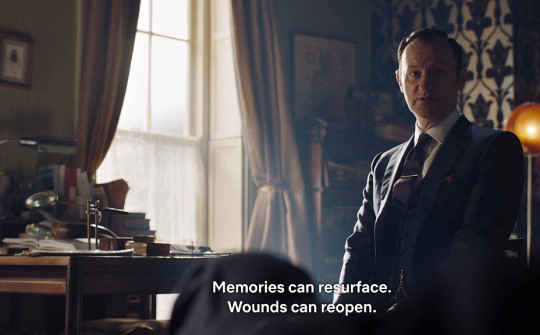
Sherlock really needs to stay alive for John’s sake. But how can you stay alive when Emotions are killing you? Sherlock might think the only solution is to bring them on and face them, try to beat them ‘in a death-defying act’. Which means Sherlock must go deeper still into his own mind, to face his demons.
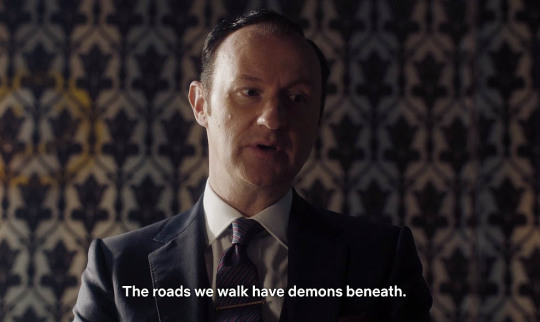
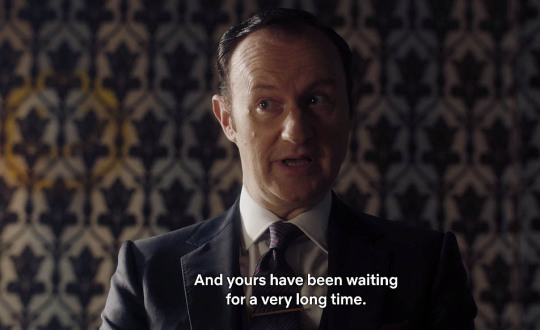
i actually think this is the single bravest thing Sherlock does in the whole show this far. And in order to face his demons and traumatic memories, he needs to perform his Mind Theatre experiments on himself. But who’s the scientist then - who is setting up the experiments? I believe this is done by Sherlock letting someone impersonate a side of himself that he has been hiding and neglecting for a very long time, and who therefore appears to be a cold, calculating psychopath to be feared and avoided: Sister Sentiment.
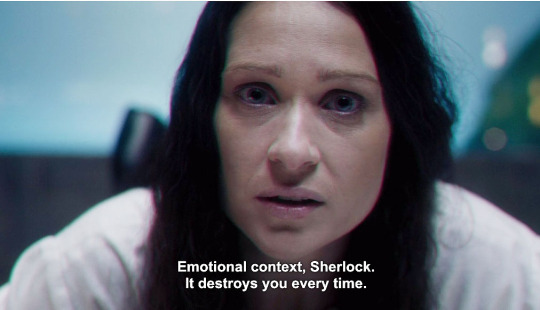
@beingallmysterious said it in their very brilliant meta about Eurus representing Emotion (my bolding, the link also contains the additions):
“The final problem then is reason vs sentiment. How do we live with emotions? Should we lock them up as Mycroft recommends? Sherlock has tried this and it didn’t work. So what’s Sherlock’s solution in the end? He lives with her. He accepts her. He becomes whole again. Reason and sentiment”.
This is, basically, what I think TFP is about. Sherlock might believe he has to defeat and disarm Eurus, but this story tells him (and us) that he rather has to embrace her, accept her as a valid part of himself. So let’s keep on running the scenarios.
TFP, Scenario 1: What happened back then?
Inspiration: It seems like this scenario starts when Mycroft is forced to talk about his and Sherlock’s upbringing and their ‘lost sister’ Eurus. We go back to their childhood and the mansion where the Holmes family used to live. So some of this might be based upon Sherlock’s real memories. But there’s also a resemblance to certain horror movies, which I doubt is a coincidence. I rather believe this is Sherlock’s way of deflecting traumatic memories he’d rather not get into. He uses characters from these movies as ‘actors’, with scary, supernatural powers representing Eurus, such as Orphan:
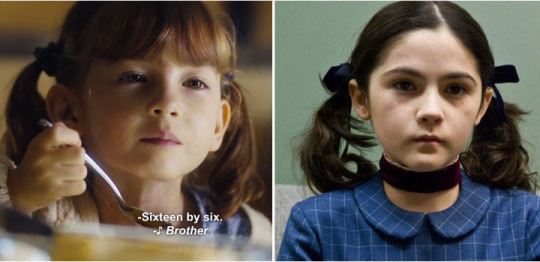
Or The Ring:
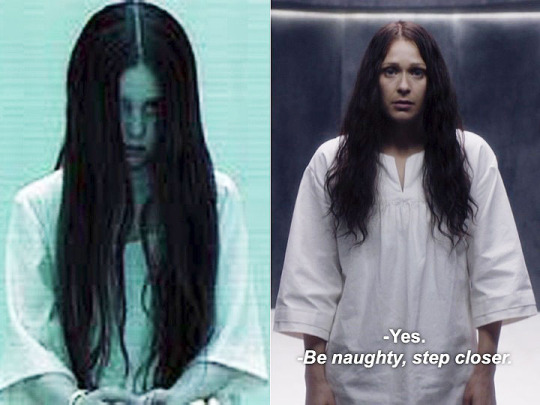
As a bonus, this girl from The Ring (Samara is her name, by the way) also happens to come out of a well (see discussion on the 5th scenario of TFP at the end of this post) and she climbs through the screen of the telly, a bit like Eurus slips through the suddenly non-existent glass wall at Sherrinford.
[Running a scenario where Sherlock and John scare Mycroft into telling the truth about their childhood, when Sherlock used to play pirates with his dog while little Eurus played alone, and they had ‘honey for tea’ at Musgrave Hall. But Eurus seemed to want Sherlock dead and set the mansion on fire, and in present time 221B gets blown up by Eurus’ ‘patience grenade’]
Result: We learn that little Eurus (=Sherlock) set the house on fire and was then ‘taken away’ to some un-named ‘suitable place’, where she started a new fire. And then Uncle Rudy ‘took care of things’; she was declared dead but secretly sent to Sherrinford. In spite of all the absurd creepiness (bizarre clowns, explosions etc), present day Sherlock’s search for his sister leads them to Sherrinford, an isolated prison island way out at sea, where she is (supposedly) locked up. And since John was only sedated at the end of TLD, he’s now with Sherlock again. But well there, the nightmare continues; Sister Sentiment takes over their free will pretty quickly.
Discussion: @sagestreet has made an interesting analysis based on the idea that the memory sticks that keep popping up every now and then in the show represent Sherlock’s “’lost’ memory (about his traumatic past and subsequently repressed gay identity)” @sagestreet theorizes that this ‘lost’ memory might be based on the experience that “Sherlock’s dad was in a gay relationship with his best friend and something went very, very wrong”. And, furthermore, what if this friend was ‘Uncle Rudy’, possibly the brother of Sherlock’s mother?
This idea would be interesting to explore further, and I replied to @sagestreet‘s meta with some more speculation: A triangle drama like this might have had an emotional impact on the kids, perhaps enough to make the older Mycroft ‘abandon’ his own feelings and try to make his little brother do the same. But if little Sherlock (=Eurus) had a too emotional personality to even manage to distinguish one feeling from the other in this mess...
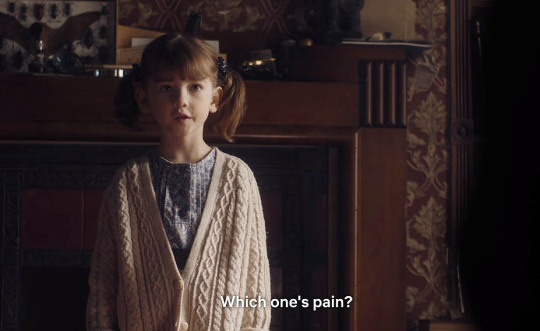
...he might have confused the situation of jealousy, guilt, anger, betrayal etc. in the family with his Dad’s sexual orientation. And it all might have been mixed up into internalized homophobia, where Sherlock would blame himself for having the same kind of feelings as his Dad, which would make him think he risked dragging others into pain and misery.
So what did actually happen? I don’t think we (and Sherlock) really get the answers in TFP, but we do get to feel some of the emotions connected to it, and that’s at least a beginning. Was there a suicide in Sherlock’s family, connected to a possible triangle drama? Or was an impending ‘scandal’ with secret-keeping in a chaotic family situation enough to mess up Sherlock’s emotional life? Was young Sherlock sent to a boarding school? Mental institution? Well, I do hope S5 will offer satisfactory answers to this.
TFP, Scenario 2: Is caring an advantage?
Inspiration: I think this is a key question for Sherlock, something he has been mulling over since he realized that his attitude doesn’t sit well with John, and maybe was the last straw in making John abandon him for someone else. John has been questioning Sherlock’s humanity at least since TGG, and possibly even earlier. If Sherlock did indeed ruin himself on drugs while reading John’s blog after the wedding (as I suggested earlier in this meta series), I think it’s relevant that this is how he came across on the blog after TGG:


So yes - this is one of the main problems that Sherlock needs to investigate in his Mind Theatre to find out what went wrong between him and John.
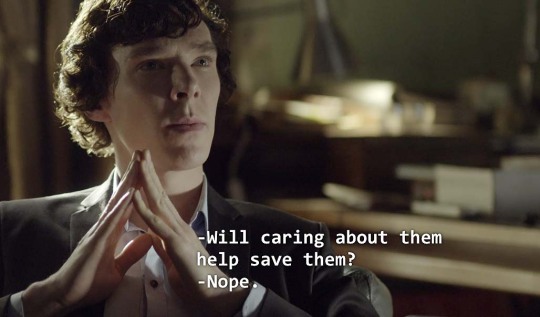
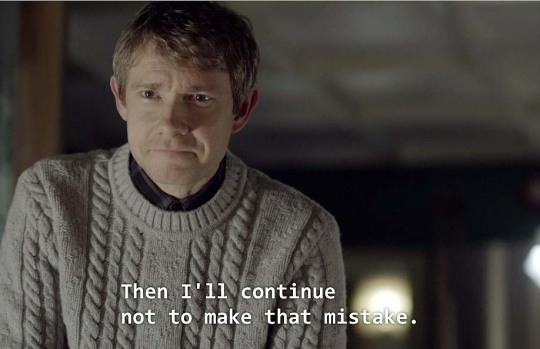
But Sherlock’s statement is contradictory (which I believe John tends to miss, at least consciously). Because trying to save people’s lives already means caring. Sherlock’s actions prove that he already does care about people - why otherwise would he work on crime solving? There are many less humanity-serving ‘games’ he could play and puzzles he could solve to keep himself entertained. So Sherlock definitely does care, but I think his real problem is that he doesn’t permit himself to feel it. Because feeling compassion means exposing himself to other people’s suffering - and his own. Sister Sentiment will make him suffer.
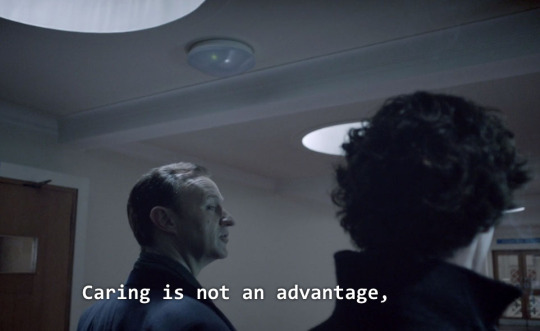
This is what Sherlock has been told, probably by Mycroft, in an attempt to protect his overly emotional little brother from the cruelty of life. The question is, though: Not an advantage for whom? Caring certainly is an advantage for the people you care about. It’s just that it might make you suffer.
[Running the scenario. For the first time in this story Sherlock exposes himself to his own experiments, rather than someone else. These are ethical dilemmas and he finally gets to the point where he’s sincere enough with himself to really face these demons. Because he used to hide from them before, which has deprived him of John. And - as @beingallmysterious said in their meta about Eurus - this is what Sentiment does to you: “Eurus puts Sherlock through torturous mind games. Doesn’t emotion do the exact same thing?” ]
Results and discussion: In Sister Sentiment’s first experiment Sherlock is supposed to make John shoot the Governor of Sherrinford, supposedly to stop Eurus from murdering his wife (which reminds me of a manipulation scheme from the mentalist Derren Brown (X). In his show ‘Push’ Brown tries to manipulate a guy, by group think and submission to authority figures, to ‘commit murder’ and push someone off a building). Sherlock seems very pragmatic about this; we don’t see him hesitate and he’s not even trying to refuse. He keeps playing entirely 'by the rules’:
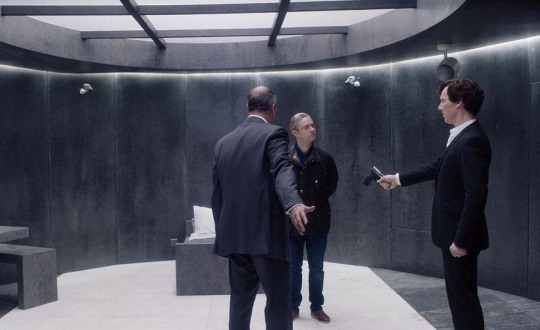
But what if the ‘rules’ are wrong? I think this mirrors how Sherlock, in a way, made John shoot the cabbie through the window in ASiP. If Sherlock had turned in the serial killer to the police instead of joining him to play mind games and prove himself clever, John wouldn’t have had to kill a person, which is a heavy weight to bear. In this scenario it gets clear that John doesn’t want to shoot someone, not even for the ‘greater good’. And in the end the Governor shoots himself to save his wife (who subsequently gets shot anyway). But the link to ASiP is clearly there, in my opinion; why else would they show us this bullet hole, which very much resembles the one where John shot the cabbie?

The next experiment is the three Garrideb brothers who are kept tied-up and dangling over the abyss. This is (supposedly) about solving a crime puzzle, and Sherlock quickly deduces who of the three brothers had committed the murder. But it doesn’t matter to Euros who the guilty is; she kills all three Garridebs anyway. Which resembles the result when Sherlock in TGG focuses a bit too much on the puzzles, without considering the victims (which enrages John). The blind lady had to spend a long time suffering in complete agony, so maybe she could no longer think clearly and started describing the criminal, who then detonated the bomb. Caring about the victim might have been an advantage for solving the case, and I think the important thing was that Sherlock’s cleverness wasn’t enough; the lady and a whole lot of other innocent people died anyway. But at least his compassion might have lessened the time of suffering for the victim. What would have happened if Sherlock had refused to condemn any of the Garridebs? We don’t know, because he thought he could save two of them by solving the puzzle and condemning the guilty one.
In the end it didn’t matter what Sherlock’s brain told him to do in these ‘experiments’; the victims died anyway. Which means caring about them at least wouldn’t have hurt. But I have a feeling that showing compassion in TGG would have solved much of the communication problems between Sherlock and John. Which I hope Sherlock finally begins to understand after TFP.
TFP, Scenario 3: What will happen if Sherlock confesses his love to John?
inspiration: I think this is one of Sherlock’s hardest tasks, because he has nothing to draw from. I think he knows - subconsciously - from TLD that he can’t bring John to ‘confess’ his feelings for Sherlock, unless Sherlock takes the first step. But having repressed his feelings for so long, this isn’t easy for Sherlock. He needs to learn to say the words, yes, but this isn’t enough; he has to actually mean it. Because if he tries to fool John in any way (like he cowardly did in the underground case in TEH), or slip away from it as in the Tarmac scene in HLV, it’s only going to hurt John further and destroy his trust. So that’s why I think Eurus (=Sherlock) sets up this experiment. He needs Molly as a mirror for John, because he isn’t ready to admit this to John’s face just yet.
[Running the scenario, involving a phone call to Molly with a threat of blowing her up if Sherlock can’t have a confession from her]
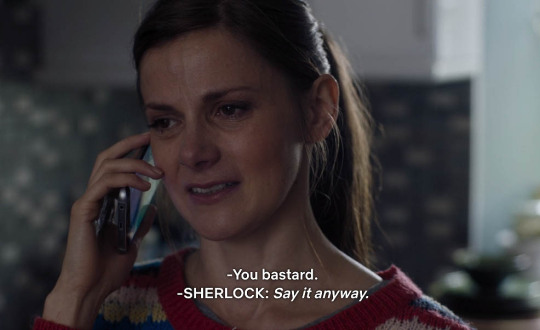
Result: It turns out that Molly (=John) won’t have any of this BS any more; it’s time for Sherlock to come clean.
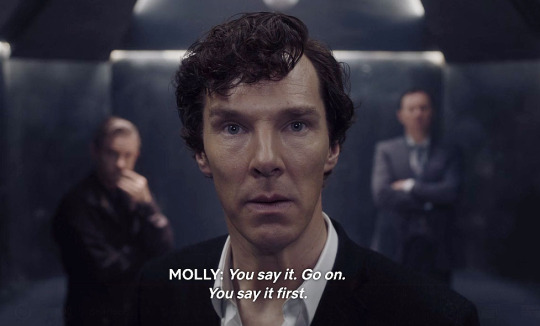
This is not about protecting John, or any other practical or ‘external’ reason for committing to him. It’s the point of no return, the moment of pure and simple honesty. “Tell John the truth” – that’s the mission. And finally, he does.
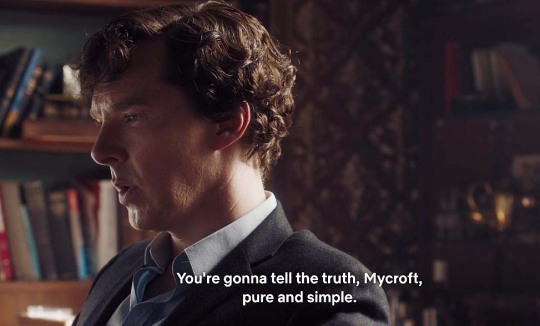
Discussion: This scenario is where I think the quote from Oscar Wilde might come in handy.
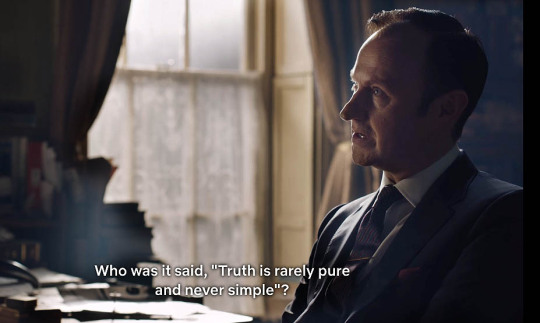
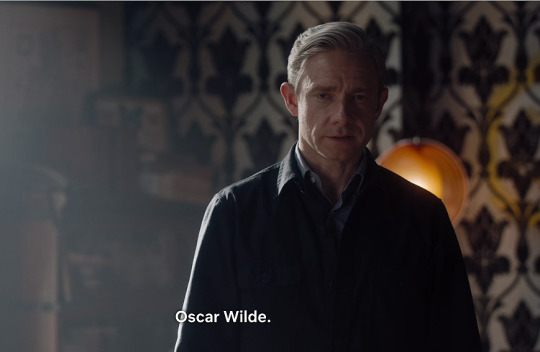
The title of the story that John, Mycroft and Sherlock are talking about is ‘The importance of being Earnest’. I’m not a native English speaker, but the word ‘earnest’ has several meanings, as far as I know. For example serious-minded, solemn, sober. But also heartfelt, sincere and impassioned. And Earnest is also the (false) name of the two protagonists in Wilde’s story, hence the wordplay in the title. In this work, Wilde is depicting two friends that keep lying about who they really are and what’s their real name, in order to escape social obligations. But the subtext is quite loud that this is rather about their relationship than the women they are (supposedly) courting.
The play premiered in London in 1895, the same year as Oscar Wilde was imprisoned and sentenced to two years of hard labour for “gross indecency” (= basically for being gay). And also the same year that has been re-hashed in this show since John’s blog got stuck on 1895 hits in ASiB.
Anyway, this scenario is a key point; it’s where I believe Sherlock finally breaks and starts allowing himself to feel and react emotionally. Sherlock sees 'I love you’ as a defeat and Eurus tells him that he has made more harm than good. But I think he’s on the right track now, because he’s letting himself feel.
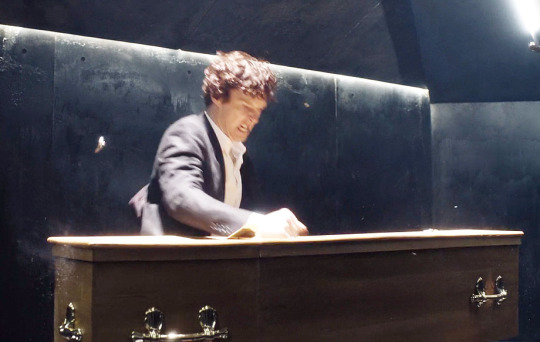
And smashing the coffin might mean that he has actually found the way to save John Watson. Save him from suicide, because that’s what I believe the coffin means, symbolically: the death of John.
TFP, Scenario 4: Heart or brain?
Inspiration: I’m not sure where exactly Sherlock draws from with this one, but this seems to be a nagging question that he has been wrestling with for some time now. In Eurus’ fourth experiment in Sherrinford, Sherlock still keeps playing the game on her terms, by accepting to choose between John and Mycroft; metaphorically heart vs brain. It seems like Sherlock has to either keep his brilliant brain and cut off his heart again, or go by his heart, which will make him lose his head and go insane.
[running the fourth model, involving a gun and a choice]
Result: For a moment, it looks like Sherlock is actually going to choose the heart option and shoot Mycroft, who tries to provoke him to do this. But Sherlock now - for the first time in this story - skips the game and goes for a third option instead: killing himself. Again. Which seems to very much be Moriarty’s (= homophobia’s) goal with this.
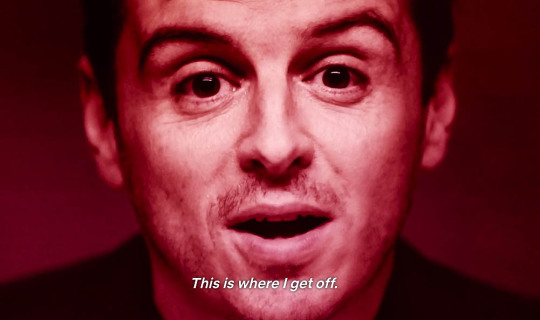
But it doesn’t work, because taking his own life is not the solution Eurus wants, so she doesn’t let him. Sherlock gets sedated, and his choice (to keep both brain and heart) only leads to another prison, where he’s surrounded by old family photos and a dog bowl (=memories). But breaking free from this and solving the Musgrave Ritual is (apparently) the solution.
Discussion: This choice could have been lengthy, but since Eurus (=Sherlock) aborts this scenario rather quickly, let’s just jump to the next one.
Scenario 5: How can Sherlock find the Truth?
The little girl on the plane, whom Sherlock has been trying to communicate with since early on in the episode, is lonely and desperate, and Sherlock is supposed to talk her down, to guide her towards the ground so she can land safely. But we also know that Mycroft (=Sherlock’s brain) was actually planning to let her crash the plane ‘for the greater good’ of other people’s safety.
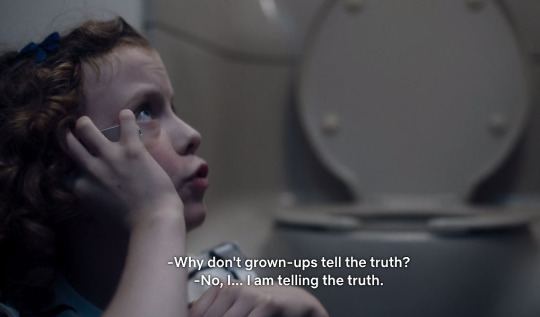
So, are you telling the truth, Sherlock? I’m not so sure about that actually... And did the grown-ups really tell you the truth about certain things when you were a kid? You do seem to doubt it.
Inspiration: Well, once again I suspect that Oscar Wilde might have been an inspiration for this experiment; “Truth is rarely pure and never simple”. But the girl on the plane might also be very much representing how Sherlock is feeling; he might have been withhold truth in his past, so he opted to seek for it himself, always, by using his brain and powers of deduction. But he feels alone and scared, up in his ‘ivory tower’.
[Running a scenario involving a puzzle based on Eurus’ song; is it the solution to this puzzle?]
Result: The little girl is, it turns out, actually Eurus (=Sherlock), who is feeling lost high up in the sky, unable to land with a sleeping driver. Finding Eurus’ “room” by solving the song puzzle means finding the truth. Which means Sherlock can finally save John from the well he’s drowning in.
Discussion: [Ironically enough, in the midst of all this (righteous) rage over the big ‘Purge’ of tumblr, I stumbled over something that I wonder if it’s not a double irony? Or a triple irony?
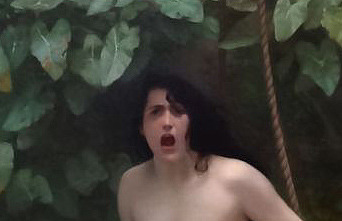
The thing is, that seeing this post about the tumblr censors flagging a 19:th century painting of the “Truth coming out of her well to shame mankind” (X), actually happened to give me something of an epiphany.]
This painting is from 1896 and it’s made by the French artist Jean-Léon Gérôme. You can read more about Gérôme’s work and see this and other of his paintings in this article here. This is the story (my bolding):
“At this time, Gérôme painted a series of works showing the personification of Truth. First, she was shown as a nude at the bottom of a well, either lying on the ground, or standing with a mirror in her hand.”
“Truth Coming out of her Well to Shame Mankind (1896) is based on a quotation from Democritus, “Of a truth we know nothing, for truth is in a well” (or, more literally, ‘in an abyss’), but knowing that reference is of little help in understanding these paintings. Gérôme had given one of the earlier paintings the title of Mendacibus et histrionibus occisa in puteo jacet alma Veritas, which translates as ‘The nurturer Truth lies in a well, having been killed by liars and actors’. In this last version, she has climbed out of the well, and instead of bearing the customary mirror, she brandishes a whip with which to scourge us.”
How many mirrors have we seen in this show by now? I think I lost count already in the unaired Pilot, but I wood guess at least some 50-ish. The point I want to make here, however, is that I believe the Truth Coming Out is central in BBC Sherlock. And in this fifth scenario we have two characters that are trapped in a well, keeping Truth hidden to the world:
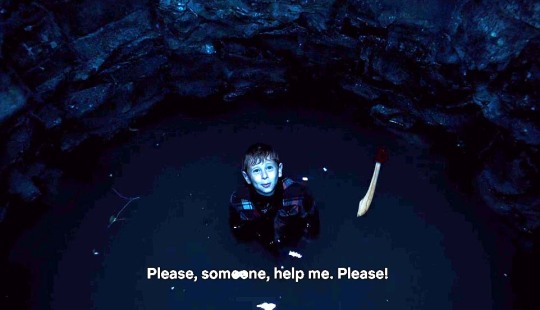
Young Victor Trevor (Sherlock’s mate from college in ACD canon)...
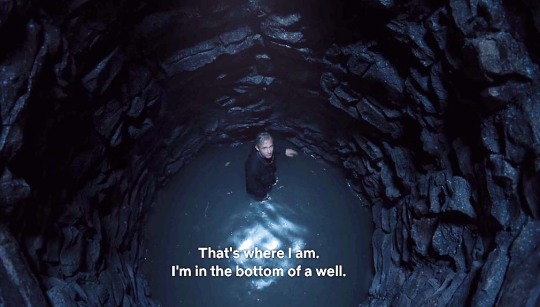
...and adult John Watson.
One of them never came out; he was ‘killed by liars and actors’, people who refused to see the Truth. So something might have happened with Victor, which contributed to Sherlock shutting down his emotions.
But the other one did come out, didn’t he?
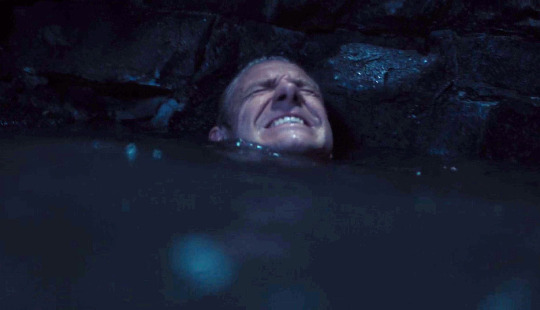
He literally did come out of his well, and he did it with Sherlock’s help. John isn’t exactly naked at the end of TFP, and he isn’t brandishing a whip (that’s Sherlock’s job - right? ;) ), so apparently John isn’t going to shame us. But John is indeed Sherlock’s Truth. If Sherlock is honest with himself, if he’s earnest, i think he must sooner or later admit exactly what John means to him. And John is wearing a blanket, just as Sherlock was after John Saved him in ASiP.
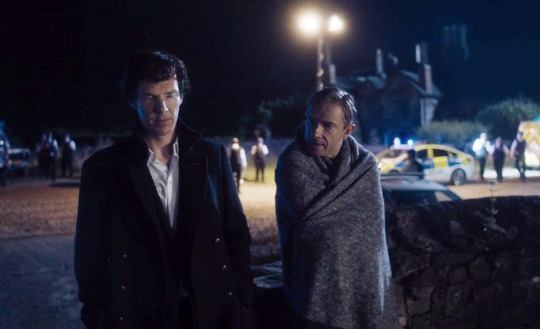
So if John is going to come out in S5, I think it’s perfectly foreshadowed here. And if he does, he’ll bring Truth with him, the true character of their relationship (which is also signaled by the codes of this episode). But it has to be with Sherlock’s help; Sherlock needs to take the first step to help him. This is the first time in S4 that Sherlock actually seems to manage to save John Watson. And he solves the puzzle by realizing that the girl on the plane is Eurus, who desperately needs a hug. Sherlock needs to embrace his own emotions, be OK with them and let them exist at the pair of his rational thinking.
Scenario #6: Does it matter who you really are?
Inspiration: A DVD is in focus here - not a memory stick this time - and it carries a message from ‘Mary’, just like the one at the end of TST, and the ‘unsolved’ (stabbed) case on Sherlock’s mantelpiece in TLD. But should Sherlock actually listen to her?
[The last scenario is a sort of ‘epilogue’ to the events in Sherrinford, where things seem to have ‘straightened up’ again.]
Result: After Musgrave, Eurus is locked up in Sherrinford again; apparently Sherlock still considers his emotional self as being too dangerous to let loose, and now she can’t even speak any more. But we also see Sherlock in a process of healing; he rebuilds 221B with the help of John, and he starts meeting Sister Sentiment regularly, communicating with her directly through the violin. And, as @loveismyrevolution commented here, the beautiful piece they are playing together is called “Who you really are”(X).
“What I try to say is that Sherlock’s emotions are that intense that they must be kept in charge and they are still locked within himself (Sherrinford), but he’s aware of them, is in contact with them, acknowledges them to the outside world and it makes him whole again”.
Discussion: 221B now has a slightly new dressing; some furniture have more rounded edges, and there’s an infant to take care of. Sherlock and John both seems happy with this. Both Greg and Molly pop in, and apparently Sherlock and John are solving crimes together again. But why is Mrs Hudson going around spraying the flat with aerosol?
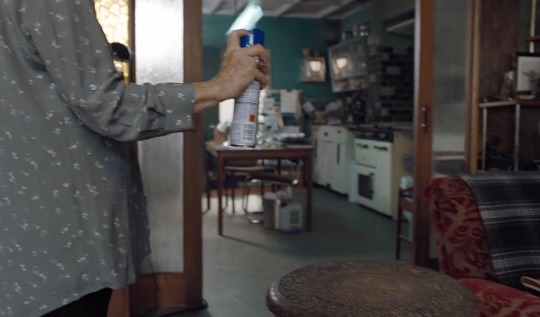
The last (and only) time we saw aerosol in this show was the poisonous, fear-inducing fog at Baskerville and Dewer’s Hollow in THoB. Does this mean that the poisonous homophobia is still around? (I’m going by the metaphors in @sagestreet‘s Follow-the-dog meta here, that the hallucinogenic fog in THoB represents homophobia). Well, to me it definitely seems so, since this important issue still isn’t addressed - far from it, actually. And what about Sherlock facing Death (=Appointment in Samara)? The skull on the wall still seems to be glowing in one of the dull colours it was displaying before 221B got blown up, and John still appears concerned:
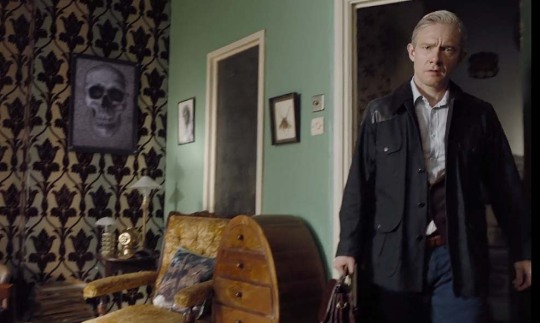
While I still believe, on both the meta level and as in-show ‘reality’, that the Holmes character is dying, at least Sherlock now seems to have faced his demons and thereby got in touch with his own, buried, emotions. But the scenario is very much dominated by ‘Mary’, whose message is two-edged:
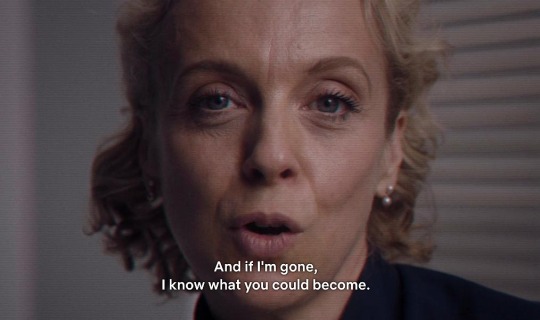
On the one hand she is hinting at what John and Sherlock could become without her. But on the other hand she claims that it doesn’t matter who they really are, and then she calls them “My Baker Street Boys”. Which I take to mean, that we could have our Holmes character two ways: Either we can keep it on a closeted, ‘myths-and-legends’ level as ‘Mary’ says, where Sherlock Holmes is an immortal, indestructible character. But if he can’t die, and he can’t fall in love, neither does he truly appear to be alive, right? The other option is that Sherlock and John need to get rid of her once and for all. Once 'Mary’s messages are no longer dominating, a time may come when Sherlock and John can become something very different from the emotionally repressed characters they remain until the end of this scenario, which has them frozen in time. They might actually come to life far more than in any adaptation this far. There’s a potential there, but also a threat. If it indeed matters ‘who you really are’, I believe this conflict has to be tackled in the next upcoming episodes.
OK, sorry for this meta-marathon, I hop it was at least barely readable. :) In the next installment I’ll analyse ‘Mary’s role more in-depth, trying to test predictions from this hypothesis:
Hypothesis #8. John is not the father of ‘Mary’s baby.
Tagging some people who might be interested: @raggedyblue @ebaeschnbliah @sarahthecoat @gosherlocked @loveismyrevolution @sagestreet @tjlcisthenewsexy @elldotsee @88thparallel @devoursjohnlock @sherlock-overflow-error
22 notes
·
View notes
Text
Rec your own fics
Fic authors self rec! When you get this, reply with your favorite five fics that you’ve written, then pass on to at least five other writers.
I was tagged by @theuncertainhour, and will try to keep it to one-shots only, as well as mix things up a bit so it’s not just the recent stuff that I’ve been spamming you all with for months.
Taps (Downton Abbey, Baxter-centric with a twist of Baxter/Molesley)
Phyllis Baxter's attic room is small and bare, with whitewashed walls and plain furnishings, but after three years in a cell, she thinks it as beautiful as any of the grand chambers belonging to the family. A life in service has trained her to expect few personal possessions and little privacy, but nothing could have prepared her for the endless humiliations and indignities of prison. Bathing and dressing without anyone watching, sleeping safely behind a solid door to which only she and Mrs Hughes have the key—these things are luxuries she will never take lightly again.
When I first got into Downton Abbey, a whopping six months ago, I went looking for Baxter-centric fic and was surprised there wasn’t much that touched on her experiences in prison. She had only just been released when her character was first introduced in s4, and I thought the effects must have lingered for quite a while, so this was my attempt to address that idea. As for Molesley’s involvement, well, he would do something like that, wouldn’t he?
Stars (Downton Abbey, Baxter/Molesley)
Miss Baxter starts a little and then looks over at him with a faint, wry smile that he can just make out in the glow from the house's upper windows. Not for the first time, he thinks how much she reminds him of the wild deer that live in the woods and meadows around Downton, all long neck and thin limbs and huge brown eyes, wary and ready to bolt at the first sign of danger.
"I'm afraid you've caught me woolgathering, Mr Molesley," she says.
More Baxter post-prison fic, this time from Molesley’s perspective. He knows about her past here, so this would be sometime after the beginning of s5 when she finally confessed to him.
Love and Languish for His Sake (A Midsummer Night’s Dream, Oberon/Puck)
For while all faeries are creatures of earth, the King's domain is verdant grass, is cool mist, is the quick living deer in the glade and the bursting fullness of ripe berries; and he, Puck, is for the crackling dead leaf, the rotting carcass, the strange fungus that sprouts up overnight. He may love the King as much as the Queen does—or more, for she is froward and difficult, and he has never refused his lord anything—but he cannot offer beauty along with his loyalty, and it breaks his heart.
This was written for the Yuletide exchange several years ago, and it’s partly about the pain of loving someone when you believe you can never be good enough for them, but also about the dark side of the faeries and the world they inhabit. Oberon loves Puck, but Oberon also does terrible things to the people he loves (he deliberately sets out to make his wife commit bestiality, just for starters), and Puck’s love for Oberon is all twisted up with fear and jealousy.
All On a Summer’s Day (The Tempest, ensemble cast)
They passed out of the wood and into a vast field of sea-grass on a high bluff that overlooked the waves, and there Miranda finally grew weary and lay down, all but disappearing in the waist-high lushness. The butterflies, seeming to realise that the chase was over, circled and returned to her, each one perching at the end of a single swaying blade. Ariel drifted close and saw that the child was half asleep already. While he stood guard over her, he sang a little song of his own devising, in a high sweet voice that mingled with the endless sighing of the wind.
Prospero is another beloved Shakespearean character who is really rather horrible when you consider his actions toward Caliban (who, granted, is awful in his own right), both before and during the play. There are suggestions in the text that Caliban loved his witch-mother and still feels loyal toward her, and I wanted to do something with that, and also with the parallels between Miranda and Caliban, both of whom grew up on the enchanted island with a parent who was a magic user.
Happy Enough (The Worst Witch 2017, Ada Cackle/Hecate Hardbroom)
"It was not nice, Ada. It was fair. A proper repayment for services rendered to the school."
"Yes, of course."
"And the girl's still here on a probationary basis as far as I'm concerned."
"So you've said." Miss Cackle reached over to pat Miss Hardbroom's arm and tutted to herself at its birdlike feel. For years she'd been on a secret campaign to fatten her deputy up, but no matter how many custard creams she was plied with, Hecate remained stubbornly whip-thin, burning off every spare unit of energy in the crucible of her own intensity.
Really just me working off my post-finale feelings, and rolling about in the warm, fuzzy blankets of the loving relationship between Ada and Hecate.
Tagging: @la-princesse-incongrue @hecate-hardbroom @broadwayfreak5357 @amarguerite and...argh, I'm blanking on other mutuals who write fic and haven’t already done this meme, so if you fit that category and would like to do it, consider yourself tagged!
6 notes
·
View notes
Text
Okay, we need to talk about John...
Absolutely full respect and compassion to everyone who felt triggered by what John did to Sherlock in TLD. I can understand why you’re upset and why you are wondering if John is still a good guy or if he crossed a line that can’t be uncrossed.
Below the cut, I’m going to take a look at it from a literary, story-telling perspective, so if that’s going to be too spoilery, too triggering, or too infuriating for you, might want to skip this one.
I’m approaching this strictly as story. Story is there to help us make sense of the real world, to serve as an emotional release, to inspire, to warn, to help us explore ideas, etc.
But it is not supposed to be the same as real life. Story is better structured, more purposeful, and more deliberate than real life. It’s also more heightened and larger-than-life.
So none of the below is meant to be taken as justification of real-life violence. This is story.
I can’t tell you for sure why Moffat chose to have John beat up on Sherlock. And I’m not going to say it was necessarily the right choice—it's art. Declaring an artistic choice to be right or wrong is very subjective and I’m not asking anyone to like the choice he made.
But I do have some guesses based on literary devices and structure of why he went that direction, so I thought I’d share those with you—and then you can feel about it as you wish.
First, story structure:
I’ve discussed story structure in relation to Sherlock before, on my website, and I don’t think I’ve ever transferred those meta to Tumblr yet.
But basically, there is a set structure to telling a story that most filmmakers (and Sherlock episodes are approached as films) use because it works the best for the audience. And because Sherlock episodes contain an ongoing story arc, we can also apply that same structure to the show as a whole, with S4 (instead of S5) bringing this story arc to a close.
You can read my meta on that here (I assumed a 5-series arc instead of 4), but the relevant part for TLD is that we’re well past the half-way point, which was the vow Sherlock made at the wedding.
That greater commitment he made must be tested, and immediately after, he was plunged into more complications and higher stakes.
At some point in all this testing and higher tension, the hero breaks or seems to have completely failed. This is called the Dark Moment, or Major Setback, or other similar term.
The dark moment or major setback began with John rejecting Sherlock. I believe it culminated in John beating the crap out of Sherlock, and then saying goodbye at the hospital.
The dark moment is, as it says on the tin, the bleakest, lowest point in the story. And the deeper you make that abyss, the more rewarding the story will be when the hero finally succeeds.
One of my favorite writing teachers has the mantra “How can you make this matter MORE?” So many writers tend to pull back, to go easy on their characters. That lowers the tension of the story, it makes the story less impactful. A good story—no matter if it is a quiet, slice-of-life story or a high-octane adventure story—pushes its characters to the breaking point.
What is the one thing this character would never do, think, or say? Put them into a position where they must do, say, or think exactly that. —Another common advice from the same writing teacher.
Basically, the Dark Moment should be as dark as you can possibly go within the plausibility of your story. There’s a 10 Commandments of Storytelling list from the author of The Princess Bride going around, and one of the commandments is pretty much exactly this.
Because this is ultimately a relationship story between John and Sherlock (and it is—whether or not that relationship becomes romantic or not, the structure is exactly the same), at the Major Setback, they had to “break up.” I warned about this in my meta and here on Tumblr.
And it had to be John walking away. Utterly rejecting Sherlock. That’s how a romance structure works. It’s not meant to be realistic, necessarily. It’s meant to show how the hero and the love interest transcend all odds to find their way back to each other.
Low stakes in a story are boring. We always say we just want them to be happy. And I think that fluffy, happy fic serves a lovely and good purpose. But an actual TV show that lacks the necessary tension and emotional lows and only gives the emotional highs gets boring.
It’s cliche, but you do need the bad to appreciate the good—in a story.
I believe Moffat chose to have John beat up Sherlock because it reaches a lower and darker dramatic point than merely having him reject Sherlock or stop talking to him. He rejected and stopped talking to Mary—his “break up” with Sherlock needed to be bigger and worse and more heartbreaking than that because he and Sherlock are the primary relationship in the show.
Did that HAVE to include violence? Mmm…perhaps not. But other options would have been yelling horrible things at him. Refusing to see him. …I’m not sure what else.
John refusing to see Sherlock kind of prevents the story moving forward. There needed to be a confrontation. Something utterly rock bottom. That way, the reconciliation would be more powerful.
Yelling horrible things at Sherlock would not be as visually interesting as having him “yell with his fists.” Moffat is a screenwriter—a visual storyteller. Given the choice, he’s probably going to pick visuals when he can.
So, they hit rock bottom, but ultimately, John’s better self prevails and there is a beautiful, poignant reconciliation.
You are not likely to see the beating addressed in any meaningful way in the show because immediately after the Dark Moment comes the Final Push—the all-out last-ditch effort for survival and to, in this case, beat the bad guy.
Working out John’s physical aggression and anger problems is low tension. It doesn’t add to the high stakes and action that is coming in TFP. They are going to have to fight, together, to beat the bad guy in order to earn their happy ending together.
And I do firmly believe it will be together. Whether that’s romantic together or platonic together, I don’t know. But the story is about the two of them, always, so obviously the story will end with the two of them happy and together.
But it’s unlikely that the show is going to have them address the beating in any real-life way because it doesn’t fit into this part of the story arc. We got a sense of John’s regret in his interrogation with Lestrade and in his discussion with Sherlock at the end of the episode. I’m pretty sure that’s all we’re going to get.
What About John’s Character? Was this OOC?
Not at all. The Dr. Watson of ACD is quite a bit different than the John Watson of BBC Sherlock. Our John has always had a simmering anger about him. He’s always been physical—in good ways and bad. He’s always been a man of action, and not so good with spoken words.
If he was to reach his breaking point, of course it was going to be physical and violent. Again, I’m not saying this is good. It’s not. But he’s never been a saint.
Larger Than Life:
Another aspect of storytelling is that you need your characters to have a heightened reality, a larger-than-life quality. Ultra realistic, mundane characters are boring.
But you also need some sense of emotional authenticity in order to make these larger-than-life characters relatable to the audience.
This plays out in the way you choose to have your characters express their emotions. It’s not that you try to replicate real life, exactly. In a story, you try to grapple honestly with the experience of being human, but you do it in a way that magnifies it, draws attention to it, and creates an emotional response in the viewer.
In John’s case, the point was to explore the ripping, violent, overwhelming emotions that come with experiencing a tragic loss, especially one that left loose ends and lingering guilt. The beating was a visceral, visual representation of those emotions. Yes, Moffat could have used words, facial expressions, tone, and Martin Freeman would have done a great job with it.
But a violent confrontation, as awful as it is, represented those deep, wordless emotions far more effectively than dialogue or other non-verbals would have. It’s not meant to be taken as real life. The emotions, yes, absolutely authentic and real. But the violence—it was a way for the audience to visualize those emotions.
I don’t think they will handle the aftermath of it “realistically” in the show, and I don’t think we are meant to view it “realistically” either.
I’m sure that’s going to be a controversial idea. And there’s definitely a conversation to be had about how toxic masculinity denies a man any emotional expression other than anger.
But I really don’t think Moffat chose the beating because he’s a violent person or enjoys violence or feels like that’s the only way for a man to express himself.
I think it was an artistic choice based on the John Watson they created for this show and based on what would fit the narrative structure and be the best way to visually portray John’s emotions. Whether it was the best artistic choice is a fair debate--I’m not honestly sure I would have made the same creative choice in my writing. I don’t know what I would alternately have done, either.
What I did love, that balanced out all that ugliness, was when John, in the end, managed to express his emotions and grieve in a way that allowed Sherlock to comfort him. That was healing, that was beautiful. And it sent a clear message that violence wasn’t cathartic, it didn’t make anything better.
What made it better, was love and gentleness, forgiveness.
#bbc sherlock#tld#meta#spoilers#John Watson#portrayal of violence on TV#story structure#creative choices
85 notes
·
View notes